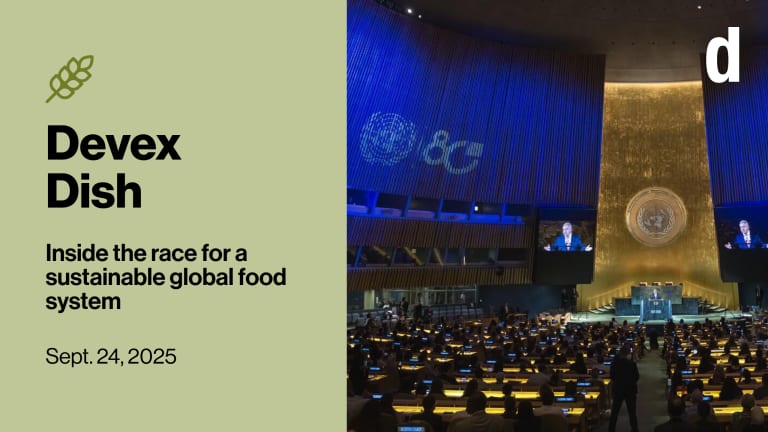
In March, the Global Alliance for the Future of Food published an analysis of the national climate plans for 14 countries, including Bangladesh, China, Senegal, the United States, and the United Kingdom. We were looking to see how well the potential for transformation of food systems to help drive down emissions had been taken into account. Overall, we found that countries were not doing enough to systematically recognize and capitalize on the significant potential gains from changing the way we grow, transport, and consume food.
Get the inside track on how agriculture, nutrition, sustainability, and more are intersecting to remake the global food system in this weekly newsletter.
This seems counterintuitive, given that agriculture and food production account for around a third of global greenhouse gas emissions, and that the contribution rises when you take into account deforestation and other land use change, which are often associated with food systems.
Our report highlights that food systems reform presents the opportunity to realize at least 20% of the emissions reductions needed by 2050 to keep global warming below 1.5 degrees Celsius.
And yet there were gaps across all the plans we looked at. For example, none of the nationally determined contributions, or NDCs, fully account for emissions from food imports, particularly those linked to deforestation and the destruction of nature and ecosystems. Germany is the only country that commits to move away from harmful subsidies that prop up intensive agricultural practices and contribute to higher emissions — such as chemical-intensive agriculture, intensive livestock production, and the production of ultra-processed foods.
None of the plans assessed include specific measures to promote healthy and sustainable diets, although this has the potential to significantly reduce emissions by nearly a billion metric tons a year. Food waste is also a big blind spot.
One-third of all food produced in the world — approximately 1.3 billion metric tons — is lost or wasted every year but France is the only country we looked at whose NDC includes comprehensive measures to reduce food loss and waste. China passed an anti-food waste law last April, but this is not reflected in its NDC.
The countries banking on food systems transformation
It was low- and middle-income countries that stood out from others as having NDCs that best took into account the potential for food systems reform to drive down emissions, and deliver a range of other benefits.
Colombia, Kenya, and Senegal have the most ambitious measures in place to promote more agro-ecological and regenerative locally led agriculture, which is less emissions intensive and good for sustainable livelihoods and equality.
Colombia’s plan includes measures to reduce emissions from cocoa, coffee, and sugar production, as well as from livestock, including through sustainable management, restoration of degraded grazing areas, and energy generation from waste.
In addition, the Colombian NDC includes measures to strengthen local agricultural capacities through training and workshops. The NDC acknowledges the importance of engaging with smallholders and local communities, and the central role of Indigenous and Afro-Colombian communities in preserving the country's forests.
Kenya’s NDC identifies agriculture as one of the sectors most vulnerable to climate change, and also as a key to meeting ambitious adaptation and mitigation targets. It promotes “climate smart” agriculture that sustainably increases productivity and resilience, reduces or removes greenhouse gases, and enhances the achievement of national food security and development goals. The strategy unites agriculture, development, and climate change and emphasizes the need for good coordination.
Our report highlights that food systems reform presents the opportunity to realize at least 20% of the emissions reductions needed by 2050.
—Kenya’s NDC also aims to build the resilience of the agricultural system through the sustainable management of land, soil, water, and other natural resources, as well as insurance and other safety nets; and to strengthen communication systems on climate-smart agriculture extension services and agro-weather issues. The plan includes measures to build climate resilience for marginalized communities by developing social safety net structures for women, youth, and other vulnerable groups. It promotes access for these groups to enterprise funds, climate finance, and credit lines.
Colombia’s NDC sets out measures to protect, conserve, and recover natural resources and ecosystems as well as strengthen its protected areas. Specifically, the NDC includes commitments to restore, rehabilitate, or recover 18,000 hectares (44, 479 acres) of degraded land in protected areas; conserve páramos, watersheds, mangroves, and seagrass fields; and promote the conservation and restoration of natural ecosystems that have been used for cattle.
There are ways in which all these countries can improve their plans, for example, by strengthening commitments on diets. They, along with all the other signatories to the Paris Agreement on climate change, have the opportunity to do this ahead of the next big United Nations Climate Change Conference — also known as COP 27 — in Egypt later this year.
The toolkit we have developed gives governments the guidance they need to improve the process, content, and implementation of their NDCs to realize the huge benefits of food systems reform for the environment, society, and the economy. With food prices rocketing and climate change already hitting people hard, there is no time to lose.









